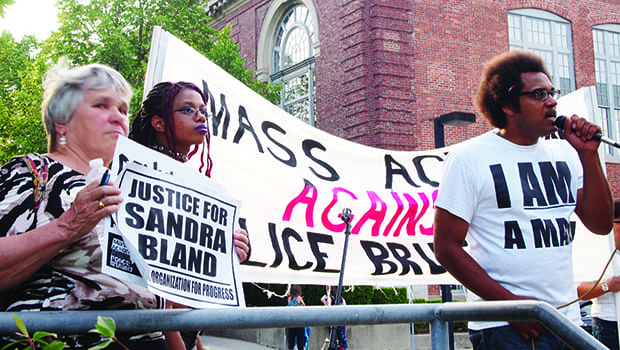Black Lives Matter activists: change slow in coming
Growing awareness, growing body count

In the year that has passed since the killing of unarmed African American teenager Michael Brown in Ferguson, Missouri, Americans have learned the names of many more victims of police violence: John Crawford III, in Ohio; Akai Gurley in Brooklyn; Tamir Rice in Cleveland; Walter Scott in South Carolina; and Freddie Gray in Baltimore.
Last month, the country added another name to the list — Samuel DuBose, a 43-year-old who was shot and killed by a University of Cincinnati campus police officer after being pulled over for not having a front license plate. His last words, caught on the policeman’s body camera: “I didn’t even do nothing.”
But unlike last summer’s killing of Michael Brown — and Eric Garner, who was choked to death by police officers in State Island about three weeks earlier — Samuel DuBose’s shooter has been charged with murder and voluntary manslaughter.
DuBose’s killer, Ray Tensing, now faces up to life in prison if convicted.
While some may point to Tensing’s prosecution as a sign that the country has made progress since the unrest in Ferguson last year, many activists, particularly those with the Black Lives Matter movement, which coalesced in the aftermath of Brown’s death, say that there’s still a long way to go until true justice has been achieved.

Demonstrators gather in Dudley Square to protest the death of Sandra Bland, who Texas authorities say was found dead in her cell after she was arrested following a traffic stop.
“A year later there’s a growing awareness of the pervasiveness of the problems of police brutality and mass incarceration and how it affects black people,” says Brock Satter, an organizer with Mass Action Against Police Brutality. The message of Black Lives Matter has resonated so deeply, he says, “It’s become almost obligatory for all the candidates running for president to at least pay lip service to it.”
“But at the same time,” says Satter, who attended the recent Movement for Black Lives conference in Cleveland, “there really hasn’t been a change in conditions on the ground. People are still getting killed by the police — almost every day, it seems. There’s very little in the way of accountability. Unlike Brown and Garner, we’ve seen a few indictments, but they’ve been few and far between, and we’ve seen even fewer — if any — convictions.”
Tahia Sykes, another organizer for Mass Action, says that the past year has opened the eyes of many Americans of what the police are capable of doing — in large part thanks to cell phone videos and police body and dash cams. “It’s exposing an entire system that a lot of us didn’t know existed,” she says.
A June Gallup poll revealed that while the majority of the public still has strong confidence in law enforcement, the number — 52 percent — has dropped five points in the last two years to its lowest point since 1993.
Some policy changes have also taken place in the year since Michael Brown’s death. The Associated Press reported this week that since the Ferguson uprising, 24 states have passed more than 40 new measures to address policing — from body cameras to anti-bias trainings, independent investigations into police use of force, and restrictions on military equipment going to local law enforcement.
In Boston, City Councilor Charles Yancey has called a hearing on a proposal to require officers to have body-worn cameras.
But Satter says that these kinds of legislative changes aren’t enough to fix all the problems with policing. After all, he says, “Ray Tensing had a body camera, but it didn’t stop him from taking the life of Sam DuBose.” Satter goes on: “Look at how the police dealt with Dylann Roof after he massacred nine people in South Carolina — they gave him a flak jacket and took him to Burger King on the way to prison. I’m pretty sure they didn’t take Freddie Gray to Burger King on the way to prison.”
Part of the solution, Satter says, is reckoning with America’s past — “the historical and present-day exploitation and oppression of black people,” he says. The removal of the Confederate flag from the South Carolina statehouse was one such example—albeit “very late”— that can be “the beginning of a broader discussion of how we got to this place in this country.”
Sykes says that this past year has also seen the conversation around police brutality open up to include women, thanks to the national Say Her Name movement and the video of Sandra Bland’s arrest in July, three days before she was found dead in a Texas jail cell.
“Women’s names are not as synonymous with this movement as Eric Garner or Michael Brown,” says Sykes. “But I think we’re on our way as a movement to seeing those women who have unjustly lost their lives.”
Satter says the activism that grew out of Michael Brown’s killing last year has “broken the pattern of apathy that defined the last several decades,” but that he’d like to see more.
“We thought 2014 was an important year with the beginning of the uprising in Ferguson, and changing the pattern of how people deal with these kinds of things that were going on well before Ferguson,” he says. “But clearly it hasn’t been enough. The thousands that got involved last year — we’d like to see that become hundreds of thousands and millions of people. That’s our intention — to reach out deeper into the community, and deeper across the country to build a real mass movement of historic proportions that cannot be denied.”
Mass Action Against Police Brutality is holding a one-year commemoration of the Ferguson Uprising this Sunday in Malcolm X Park.


![Banner [Virtual] Art Gallery](https://baystatebanner.com/wp-content/uploads/2024/04/Cagen-Luse_Men-at-store-e1713991226112-150x150.jpg)



